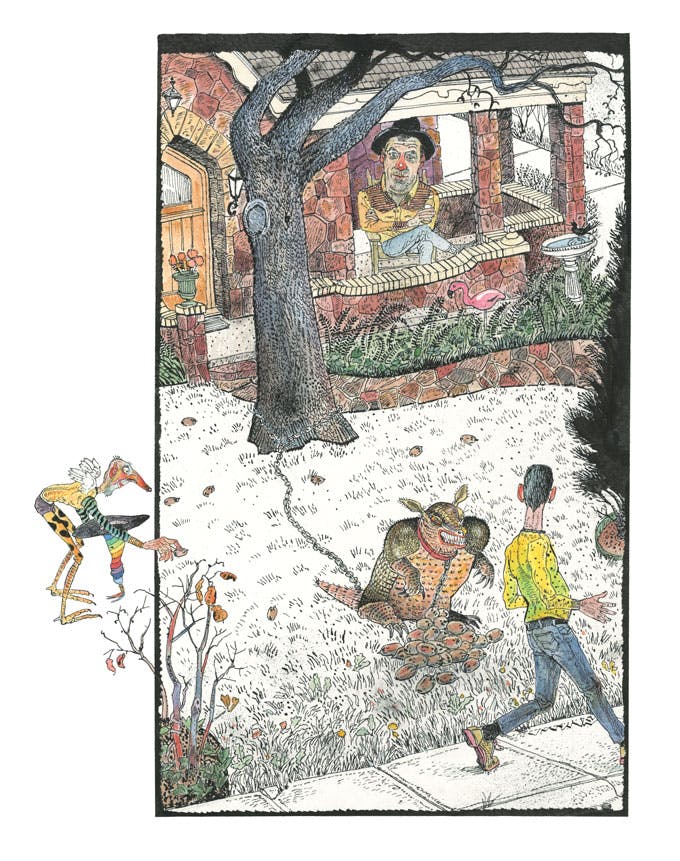
Q: The area where I live is blessed with an abundance of pecan trees. During this latest pecan season there was a heated discussion on my neighborhood Listserv about people coming into yards to collect pecans without asking the homeowners first. Some were fine with it and others were not. What’s your take?
Courtney S., Austin
A: The pecan tree, a.k.a. Carya illinoinensis, is the official state tree of Texas, the producer of the official state health nut of Texas, a provider of good shade, and the origin of innumerable delicious pralines and pies. The Texanist is the proud owner and overseer of a particularly beautiful specimen, which towers nobly over his front yard. Yet while the tree did indeed put out like a trollop last year, the Texanist did not witness anybody traipsing into his yard for the purpose of getting after his own precious nuts. At least in his neighborhood, the old Texan taboo against trespassing, so deeply ingrained in our rural areas, seems to have survived the widespread citification that has crept like a plague over our once more-pastoral state (and that is, the Texanist has just been reminded by his editor, the theme of this month’s special issue). However, for the purposes of advice-giving, let’s suppose that some clueless recent immigrant from, say, Los Angeles had intruded into his one-tree orchard. It’s safe to say that the Texanist would not have suffered the fool lightly, addressing him with the disdain that he saves for pesky squirrels and suspect mechanics, perhaps even punctuating his tirade with a menacing reference to a can of whup-ass. It does not hurt to occasionally frighten these newcomers. We must all defend against the cultural watering-down that is the by-product of the massive migration of peoples from other states to our Texas cities. Sometimes fear is the best instructor, and everyone should learn that without prior arrangements, a person’s pecans are best left untouched. You are encouraged to share this view with those on your neighborhood Listserv, some of whom, let’s face it, might be from Seattle. The Texanist used to subscribe to his neighborhood Listserv, but he found it to be overly saturated with absurd rants against lemonade stands and leaf burning and not saturated enough with announcements of upcoming pie socials.
Q: I am the only child of a West Texas ranching family, but I currently reside in San Francisco. I just got engaged to the man of my dreams, a native San Franciscan. We’re very happy and we plan on staying put in California, but this is hard for my father, who always thought that I would marry a rancher and take over the operation. I’m happy, but I feel guilty. Please tell me that my dad isn’t going to secretly blame me forever for bringing about the end of the ranch.
Sandra Rutledge, San Francisco, California
A: What in tarnation? Things are going in the wrong direction. First, there was that question about Angelenos overrunning the state and looting all our pecans; now a rancher’s daughter is abandoning Texas for the weird charms of San Francisco. Sadly, the demise of our family spreads, be they farm, ranch, or some combination thereof, is symptomatic of the long-running citification referred to above, a terrible pestilence that has spread across these once pristine lands like the advance of some awful disfiguring blight for which there is no— [Editors’ note: The Texanist is having a conversation with his editor. He will return shortly.] Okay, then. The Texanist is back. Miss Rutledge, please pardon the interruption. It seems that, as noted above, this month’s issue is intended to be some sort of celebration of urban life, and therefore the Texanist has been encouraged to refrain from further comment about how, despite all the “progress” it has brought, the growth of our cities and the loss of good country people like yourself is actually ruining Texas and making it more like everyplace else. The lamentable fact is that your own rural-to-urban migration is not new. And while it’s probably a big waste of time to wish that two San Franciscans would ever bring forth a little one that would one day end up back on the ranch at his or her grandpa’s side, mending fences and castrating calves, it’s not an ironclad impossibility. The Texanist, for one, holds out hope. Even if that doesn’t come to be, though, you’ve got an ace in the hole: just about the only thing a Texas rancher loves more than his chosen way of life and a favorable weather forecast is a daughter.
Q: My wife says the time has come for us to finally buy our own home, and she has her heart set on an apartment in a high-rise near the Museum District. I like it, except for one thing: outdoor grilling. The apartment doesn’t have a backyard, or even a balcony, and the only place for grilling is in a common area near the swimming pool, which is a walk down a hall, an elevator ride, and another long walk to an array of gas grills. The distance from grate to table at our rent house is sixteen steps. Does this sound like a deal killer to you?
Jerry S., Houston
A: The Texanist is going to attempt to answer your query without remarking on the fact that it sounds like one better suited to the advice columnists at the Chicago Tribune. “High-rise”? “Common area”? “Elevator”? Is this a home you’re talking about or a law office? While the words “grill proximity,” “ease of grill,” or “grillability” rarely appear among the listed amenities for a particular piece of real estate, this is obviously an essential feature for many a potential homeowner. In the Texanist’s mind, which is beginning to feel like a besieged fortress, if the distance between what we’ll call point G (for grill) and point K (for kitchen) is equal to or greater than what a reasonable carnivore might consider to be “too damn far,” then it could just be that you’ve reached point U (for unlivable).
Q: I know there are city folk who sometimes like to get away to the peace and quiet of the country and have secondary places there, but I don’t know of any country folk who have city places. Are there people who like to get away from the peace and quiet of the country to the hustle and noise of the city? Is there such a thing as an “urban getaway”?
Bee Miller, San Angelo
A: There now exist two states known as Texas. There’s mythic Texas, the Texas people think of when they think of Texas, and then there’s actual Texas, the Texas where the vast majority of today’s Texans actually reside. Some actual Texans do like to spend a few weekends a year out in mythic Texas, among mythic Texans, where the Lone Star fires that burn within can be rekindled a bit. As for mythic Texans, sometimes they like to visit actual Texas, perhaps for an appointment with a medical specialist, or to get some decent cheese, or just to catch a moving picture. The Texanist suspects that a trip like this could also be referred to as an “urban getaway.”








